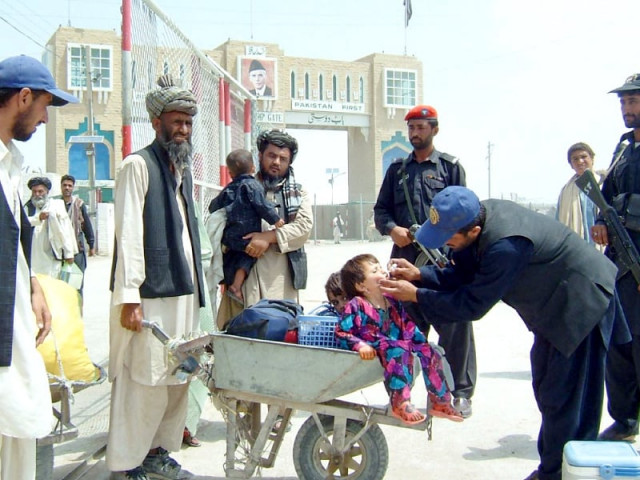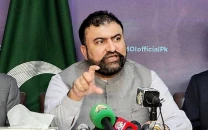Crippling virus: Refusal to vaccinate children sets off alarm bells
More than 20,000 parents refuse to inoculate their children in Quetta Valley, Pishin and Qila Abdullah districts .

Children administered polio drops in Balochistan. PHOTO: FILE/ONLINE
Pakistan is one of three countries in the world where poliovirus remains endemic. Recently, the World Health Organisation (WHO) called Pakistan the “epicentre of poliovirus in the world”. Rising polio cases triggered fears that Pakistanis might face travel restrictions, if the spread of polio is not checked in the country.
Around 47 polio cases have been reported so far this year. Most of the cases emerged in the northwest, in the Federally Administered Tribal Areas to be precise, where a Taliban ban and negative propaganda against the vaccine has been hampering immunisation campaigns.
However, refusal to immunization has also been reported in the southwest of the country. At least 26,000 parents in the Quetta block that comprises Quetta Valley, Pishin and Qila Abdullah districts refused to vaccinate their children during a three-day campaign in March. The Quetta block has been declared a high-risk area, which is why vaccination drives are repeatedly held here, once or twice a month.
Around 20% of parents refused on religious grounds while 30% complained that they cannot administer anti-polio drops over and over again. “Children of this area are at high risk of contracting polio. This is a serious issue,” said Dr Jawahir Habibi, communication specialist of UNICEF based in Quetta, while talking to The Express Tribune.
However, 15,000 families have reportedly been persuaded by social mobilisation teams which were hired by the government and an international health organisation working in collaboration with the government. “About 70% families have been persuaded to vaccinate their children, which means there is a huge decline in refusal cases,” added Habibi.
There are about 200 people working as social mobilisation staff in Quetta block. “They belong to local communities. They mobilise and engage local tribal elders, politicians and parents to participate in vaccination campaigns,” said Habibi.
The parents and elders of the families often refuse terming anti-polio drops a Western conspiracy against the Muslim world. A campaigner cited the Fatwa (decree) of a local cleric in which he declared polio vaccination a conspiracy against growing Muslim population in the world.
Another campaigner, however, cited a recent incident where a woman and man, impersonating polio vaccinators, kidnapped a baby from a Quetta neighbourhood. Though the baby was rescued, it sent a negative message about the campaign. “People are scared and suspicious that we may take away their babies,” the campaigner said requesting anonymity.
No polio case has been reported in Balochistan since June 2010. It might be good news. But the recent detection of poliovirus in the environment alerted the campaigners.
Poliovirus was found in the environment in Quetta after the WHO collected samples from sewage. “The results of samples collected from sewage in the Sur Pul area of Quetta turned positive. It means the virus exists and could attack the vulnerable children,” said Dr Anwar Bugti of the WHO.
“The virus was first detected from Takhtani Bypass on the outskirts of Quetta, in Feb 2013, and the second time in December 2013. In both cases, it was found that the virus came from Afghanistan and Karachi,” said Bugti. Most recently poliovirus was found in March 2014 in the Sur Pul area.
On a positive note, he said that the anti-polio drive is going well in Balochistan as no fresh case has been reported in the province since June 2010. According to WHO doctors based in Quetta, they collect samples from three spots in Quetta during every anti-polio drive.
Most at risk
With vulnerable and malnourished children most at risk of contracting the virus, latest data raises the bar of concern. Recent surveys show heart-wrenching results, as more than half of the children below the age of five in Balochistan are at high risk because 52% children are chronically malnourished, stated the Pakistan Health Demographic Survey (PDHS) 2013.
The surveys further say that out of every 1,000 live births, 111 children die before their fifth birthday. Ninety-seven of these children die within one year of their birth. About 60% of these deaths are due to communicable and vaccine preventable diseases. Only 16% of children in Balochistan are fully immunised and protected against eight diseases.
Published in The Express Tribune, April 16th, 2014.



















COMMENTS
Comments are moderated and generally will be posted if they are on-topic and not abusive.
For more information, please see our Comments FAQ